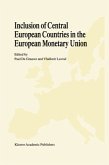A key objective of the Central European Economies (CEE) on their transition path from planned to more market-oriented economies has been membership of the European Union (EU). The start of Economic and Monetary Union (EMU) in 1999 has added membership of the EMU to the agenda for the CEEs. The task of the so-called Visègrad countries (the Czech and Slovak Republics, Hungary and Poland) of preparing for EU and EMU membership is the key theme underlying the papers contained in this volume. There are many issues to be resolved before the Visègrad countries are admitted into the EU, and this volume focuses on the issues relating to macroeconomic policies and financial sector structures. The chapters of Central Europe Towards Monetary Union: Macroeconomic Underpinnings and Financial Reputation contain new theoretical and empirical results and also comprehensive institutional overviews. The intended readership of the book is policy makers and economists working in the academic and financial sectors.








